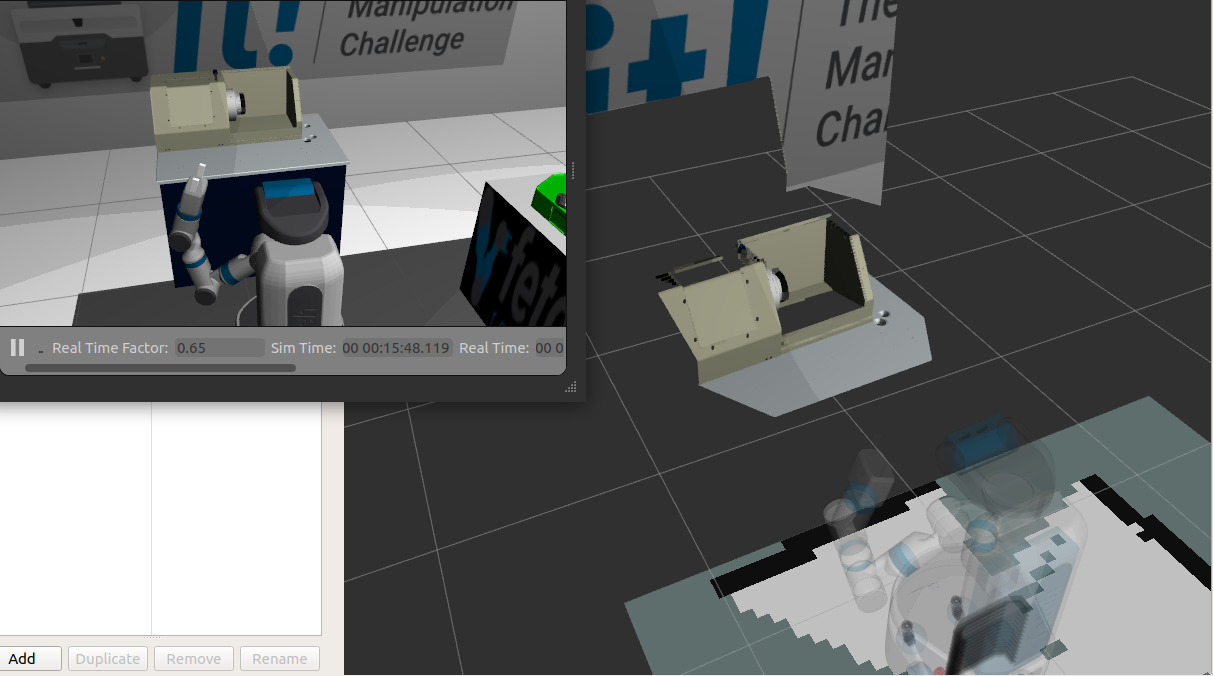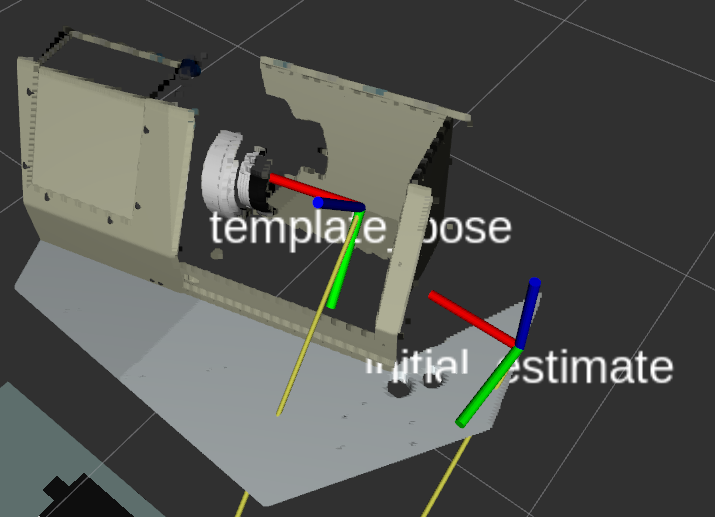Package Summary
Enables matching a mesh model file (e.g. STL) to a point cloud using ROS.
- Maintainer status: maintained
- Maintainer: Angel Daruna <adaruna3 AT gatech DOT edu>
- Author:
- License: BSD 2-Clause License
- Source: git https://github.com/GT-RAIL/rail_mesh_icp.git (branch: melodic-devel)
Contents
About
The intended use for rail_mesh_icp is to allow RGBD sensing platforms using ROS to match a mesh model (e.g. an STL file) to point clouds. This is useful in cases where an accurate estimate of the model's 6-DoF pose in the point cloud is needed (e.g. grasping/manipulation).
Newly proposed, mistyped, or obsolete package. Could not find package "rail_mesh_icp" in rosdoc: /var/www/docs.ros.org/en/api/rail_mesh_icp/manifest.yaml
Nodes
template_matcher_node
template_matcher_node matches a model (source) point cloud to a target point cloud using service calls to the icp_matcher_node and an estimate of the object's 6-DoF pose. This 6-DoF pose estimate can come from an external detector via service calls for dynamic objects or predefined in a launch file for static objects. The target point clouds can either be raw point clouds from a sensor_msgs/PointCloud2 topic or pre-processed point clouds included in the service calls.Subscribed Topics
<~/pcl_topic parameter> (sensor_msgs/PointCloud2)- Incoming point cloud data.
Published Topics
~/template_points (sensor_msgs/PointCloud2)- Source point cloud for matching published when debugging.
- Target point cloud for matching published when debugging.
- Source point cloud transformed by the approximated transform to match to the target point cloud published when debugging.
Services
~/match_template (rail_mesh_icp/TemplateMatch)- Matches a source point cloud to a target point cloud using an initial pose estimate, returning the final approximated pose and matching error between point clouds. Both the initial pose estimate and target point cloud can be predefined values/topics or provided at execution in the service calls depending on the use case.
Parameters
~/debug (bool, default: true)- Flag to publish debugging point clouds like ~/matched_template_points.
- Flag to publish approximated matching frame ~/template_frame parameter.
- Target point cloud topic to match source point cloud to when ~/pre_processed_cloud is false.
- Flag set to match the source point cloud (template) to the target_cloud provided in the ~/match_template service. When false, matches the source point cloud to point clouds from ~/pcl_topic.
- Name of the source template point cloud file in the cad_models folder with a ".pcd" file extension.
- Frame in which the source and target point clouds are matched (target point cloud transformed to this frame for matching).
- "X Y Z Roll Pitch Yaw" pose of the template point cloud in the ~/matching_frame frame used as the initial estimate when the latch_initial parameter is true.
- Flag set to latch the initial pose estimate specified as a launch parameter in ~/initial_estimate_string. When false, uses the initial_estimate transform provided in the ~/match_template service.
- "X Y Z Roll Pitch Yaw" optional additional transform between a matching template and the approximated output pose. This is useful when the matching template frame is not centered at a desired point (i.e. not a handle for manipulation).
- Child coordinate frame used to designate approximated matching pose that is visualized when ~/visualize is true.
icp_matcher_node
icp_matcher_node matches a template point cloud to a target point cloud using PCL's Iterative Closest Point (ICP) class template pcl::IterativeClosestPoint.Services
/icp_match_clouds (rail_mesh_icp/ICPMatch)- Matches a template point cloud to a target point cloud, returning the matched point cloud, approximate transform from template to target point cloud, and matching error between point clouds.
Parameters
/icp_matcher_node/iterations (int, default: 50)- Max number of iterations to fit template cloud to the target cloud. See pcl::IterativeClosestPoint for more information.
- Max allowable distance for matches in meters. See pcl::IterativeClosestPoint for more information.
- Set the transformation epsilon (maximum allowable translation squared difference between two consecutive transformations) in order for an optimization to be considered as having converged to the final solution. See pcl::IterativeClosestPoint for more information.
- Set the maximum allowed Euclidean error between two consecutive steps in the ICP loop, before the algorithm is considered to have converged. See pcl::IterativeClosestPoint for more information.
mesh_sampler_node
mesh_sampler_node uniformly samples a polygon mesh in PLY format to create a point cloud of the mesh file. Inputs are the mesh file and outputs are the sampled point cloud. Sampling resolution and number of samples can be changed, use -h when running the node for more information.
Installation
To install the rail_mesh_icp package, you can install from source with the following commands:
- Toggle line numbers
1 cd /(your catkin workspace)/src 2 git clone https://github.com/GT-RAIL/rail_mesh_icp.git 3 cd .. 4 catkin build rail_mesh_icp
Making the Mesh (Source) Cloud
After you have mesh model for your object, convert it to a PLY (i.e. .ply) file format so the mesh sampling tool
can read the file format and convert it to a point cloud. In Ubuntu, [Mesh Lab](http://meshlab.sourceforge.net) allows you to import many mesh model formats (e.g. STL, PLY, DAE) and convert them to PLY via the Import Mesh and Export Mesh options.
- With the mesh model in PLY format, you can call the mesh sampling tool via `rosrun rail_mesh_icp mesh_sampler_node
[INPUT_MESH_MODEL].ply [OUTPUT_POINT_CLOUD].pcd. Optional arguments, like sampling density, are detailed using -h`.
If the sampling tool was successful, there should now be a .pcd file in the cad_models folder.
Running a demo using the Fetch platform
An example launch file to match the corner.pcd template in the cad_models folder to a static environment object is template_match_demo.launch. It's intended use is with the Fetchit Challenge environment. Please follow tutorials found here to install the environment and robot simulator.
Launch a simulation of the fetch and simulation environment using roslaunch fetchit_challenge main.launch.
Launch the navigation stack to enable localization via roslaunch fetch_navigation build_map.launch.
AFTER launching navigation, teleop the Fetch to face the front corver of the large recangular machine using keyboard teleop via rosrun teleop_twist_keyboard teleop_twist_keyboard.py making sure the Fetch's published point cloud under topic /head_camera/depth_registered/points clearly captures the corner of the machine as shown below:

Start the template matching and icp nodes using the demo launch file via roslaunch rail_mesh_icp template_match_demo.launch. This should launch a version of the generic template matching node (i.e. template_matcher_node) specific to matching the corner template along with an ICP matching node (i.e. icp_matcher_node) automatically.
Verify that the new initial_estimate frame in tf is near the corner of the schunk machine. This initial guess is used to initialize the template_matcher_node for ICP. If the initial_estimate is off by more than 0.1 m and/or 20 degrees along each axis, ICP might not find a registration between the template and viewing point cloud. If the estimate is too far, adjust it in the launch file (i.e. adjust variable initial_estimate inside template_match_demo.launch). This can also be done faster using static_transform_publisher directly.
A service call to detect the corner via rosservice call /template_matcher_demo_node/match_template will start the template matching. Once matched, an estimated frame named template_pose should appear in tf with the x-axis aligned to the center of the cylindrical part of the machine as shown below:

Note that this template pose can be changed arbitrarily with respect to the matched template using the template_offset launch argument. Additionally, if debug is enabled you can view the target, template, and matched template point clouds in rviz by subscribing to target_points, template_points, matched_template_points, respectively.
Matching to other templates (bin, handle, etc.)
To do this, simply create another launch similar to the template_match_demo.launch which is currently set up specifically for the machine matched in the demo. The main changes will be updating initial_estimate, template_offset, provide_processed_cloud, latch_initial_estimate, and template_filename.
Note that for moveable objects in the environment, the initial_estimate can be given along with each ~match_template service call.